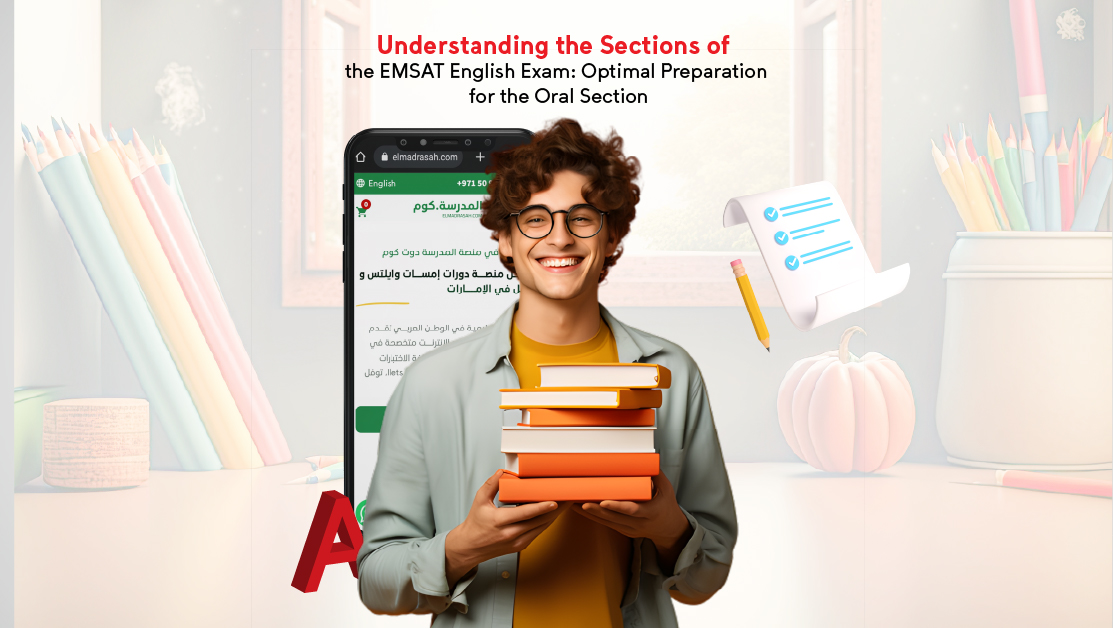
The EMSAT English Exam is a standardized assessment designed to evaluate an individual’s proficiency in the English language. It serves as a crucial benchmark for academic and professional opportunities where English proficiency is a requirement. Understanding the different sections of the EMSAT English Exam is essential for optimal preparation and success. To aid candidates in their preparation, there are numerous resources available, including English EMSAT Exam practice exercises and English Standardized Tests Sample Questions. These practice exercises and sample questions provide valuable insights into the format and types of questions that may be encountered in the EMSAT English Exam.
The Structure of the EMSAT English Exam
The EMSAT English Exam is a standardized assessment designed to evaluate an individual’s proficiency in the English language. To fully comprehend the exam and effectively prepare for it, it is essential to understand the different sections that comprise it. This article provides a detailed breakdown of the sections of the EMSAT English Exam, with a special emphasis on the oral section. Sections of the EMSAT English Exam:
- Grammar: The grammar section evaluates a candidate’s understanding and application of English grammar rules. It includes questions that test topics such as verb tenses, sentence structure, subject-verb agreement, articles, prepositions, and other grammatical concepts. Candidates are assessed on their ability to recognize and correct grammatical errors.
- Vocabulary: The vocabulary section measures a candidate’s knowledge and usage of English vocabulary. It includes questions that assess word meanings, synonyms, antonyms, idiomatic expressions, and context-based vocabulary usage. Candidates need to demonstrate a wide-ranging vocabulary and the ability to select appropriate words in different contexts.
- Sentence Construction: The sentence construction section examines a candidate’s ability to construct grammatically correct and coherent sentences. Candidates are required to rearrange words or phrases to form meaningful and well-structured sentences. This section assesses sentence formation, sentence order, use of connectors, and overall sentence clarity.
- Cloze Reading: The cloze reading section evaluates a candidate’s understanding of context and ability to fill in the missing words in a given passage. Candidates need to select the most appropriate words from a provided list to complete the passage, ensuring that the completed text maintains consistency in meaning and grammar.
- Extended Reading: The extended reading section assesses a candidate’s comprehension skills and ability to extract information from longer passages. Candidates are required to read longer texts, such as articles or essays, and answer questions based on the information presented. This section evaluates reading comprehension, understanding main ideas, identifying supporting details, and making inferences.
- Writing: The writing section examines a candidate’s ability to express ideas coherently and effectively in written English. Candidates are typically asked to write essays or short responses on given topics. This section assesses the candidate’s writing skills, including organization, clarity, grammar usage, vocabulary selection, and overall proficiency in presenting ideas in a well-structured manner.
- Oral Section: The oral section holds significant importance in the EMSAT English Exam. It assesses a candidate’s spoken English proficiency through conversations with examiners or participation in group discussions. This section evaluates pronunciation, fluency, vocabulary usage, grammar accuracy, and the candidate’s ability to express ideas and opinions effectively.
Understanding the structure of the EMSAT English Exam is crucial for successful preparation. By familiarizing themselves with the different sections, candidates can focus their efforts on improving specific language skills and allocate study time effectively. While all sections are important, the oral section plays a vital role in evaluating a candidate’s ability to communicate effectively in spoken English. By devoting ample time to practice and enhancing proficiency in each section, candidates can enhance their overall performance in the EMSAT English Exam and increase their chances of success.
Understanding the Oral Section of the EMSAT English Exam
The EMSAT English Exam is a standardized assessment that evaluates an individual’s proficiency in the English language. Among its various Sections of the EMSAT English Exam, the oral section holds significant importance as it directly assesses a candidate’s ability to communicate effectively in spoken English. This article provides a detailed description of the oral section of the EMSAT English Exam, including its format, duration, and objectives.
The EMSAT English Exam consists of several sections, each designed to evaluate different language skills. These sections include grammar, vocabulary, sentence construction, cloze reading, extended reading, writing, and the oral section. While all sections are essential, the oral section specifically focuses on assessing a candidate’s spoken English proficiency.
The oral section of the EMSAT English Exam aims to evaluate a candidate’s ability to communicate fluently, accurately, and coherently in spoken English. It provides an opportunity for candidates to showcase their language skills in real-time interactions. The section typically consists of conversations with examiners or participation in group discussions.
The oral section may be conducted in a one-on-one setting or as a group discussion, depending on the specific administration of the exam. In a one-on-one format, candidates engage in a conversation with an examiner who asks questions or presents prompts for discussion. In a group discussion format, candidates interact with other candidates and discuss a given topic under the guidance of an examiner.
The duration of the oral section can vary depending on the specific exam administration. Typically, candidates are allotted a specific time frame, ranging from a few minutes to around 15 minutes, to complete the oral section. The exact duration may vary, and candidates should be mindful of managing their time effectively to address the prompts or questions within the allotted time.
The oral section aims to assess various aspects of a candidate’s spoken English proficiency. The objectives of this section include:
- Pronunciation and Intonation: Candidates are evaluated on their ability to pronounce English words accurately and use appropriate intonation patterns. Clear and understandable pronunciation is essential for effective communication.
- Fluency: The oral section assesses a candidate’s ability to speak English fluently, without unnecessary pauses or hesitations. Candidates should strive for a smooth and continuous flow of speech.
- Vocabulary and Grammar: Candidates are expected to demonstrate a wide-ranging vocabulary and accurate grammar usage during the oral section. This includes using appropriate words, phrases, and sentence structures to convey ideas effectively.
- Coherence and Cohesion: The oral section evaluates a candidate’s ability to organize their thoughts and express ideas coherently. Candidates should demonstrate the skill to connect their ideas logically and maintain a clear line of communication.
- Expressing Ideas and Opinions: Candidates are assessed on their ability to express ideas, opinions, and arguments clearly and effectively. They should demonstrate critical thinking skills and the ability to support their viewpoints.
Examiners use a scoring rubric to assign scores based on the performance in each evaluation parameter. The rubric may include rating scales or descriptors that reflect varying levels of proficiency in pronunciation, fluency, vocabulary, grammar, and coherence. Scores are assigned based on the candidate’s overall performance in each parameter, providing an objective assessment of their spoken English skills.
In the oral section of the EMSAT English Exam, candidates are evaluated based on multiple criteria. Pronunciation, fluency, vocabulary, grammar, and coherence are among the key parameters used by examiners to assess candidates’ spoken English proficiency. By understanding these evaluation criteria, candidates can focus their efforts on developing and improving the specific skills required to excel in the oral section. Comprehensive preparation, including practicing pronunciation, enhancing fluency, expanding vocabulary, refining grammar usage, and organizing ideas coherently, will enhance performance and increase the chances of success in the EMSAT English Exam.
Effective Preparation Strategies for the Oral Section
The oral section of the EMSAT English Exam plays a crucial role in assessing a candidate’s spoken English proficiency. Adequate preparation for this section is paramount as it directly impacts overall exam performance. This article highlights the importance of preparation for the oral section and provides valuable strategies to enhance pronunciation, fluency, vocabulary, grammar skills, coherence, and organization.
The EMSAT English Exam consists of multiple sections, including grammar, vocabulary, sentence construction, cloze reading, extended reading, writing, and the oral section. Each section evaluates different language skills, with the oral section specifically focusing on spoken communication abilities.
Sufficient preparation for the oral section is vital as it enables candidates to showcase their language skills confidently and effectively. Adequate preparation allows candidates to familiarize themselves with the exam format, gain confidence in their ability to express ideas clearly, and minimize anxiety associated with spontaneous speaking situations. Moreover, thorough preparation positively impacts overall exam performance, leading to better results.
Enhancing Pronunciation and Fluency:
- Practice Speaking in Front of a Mirror:
Speaking in front of a mirror enables candidates to observe their facial expressions, mouth movements, and body language. This technique helps refine pronunciation, correct articulation, and improve overall fluency. - Record and Analyze Your Voice:
Recording practice sessions allows candidates to listen back and identify areas for improvement. Analyzing pronunciation, intonation, and fluency patterns helps in refining speech and making necessary adjustments. - Participate in Conversation Clubs:
Joining conversation clubs or language exchange programs provides opportunities to engage in discussions with native or proficient English speakers. Regular practice in a supportive environment enhances fluency, vocabulary usage, and confidence in real-time conversations.
Expanding Vocabulary and Grammar Skills:
- Read English Literature:
Reading English books, newspapers, articles, and blogs exposes candidates to diverse vocabulary and sentence structures. It improves vocabulary retention, comprehension skills, and enhances grammatical knowledge. - Use Vocabulary-Building Apps:
Utilize vocabulary-building apps and online resources that offer word lists, flashcards, and interactive exercises. These tools help in expanding vocabulary and reinforce word usage in different contexts. - Practice Grammar Exercises:
Engage in grammar exercises tailored to specific language areas, such as verb tenses, sentence structures, and subject-verb agreement. Consistent practice enhances grammatical accuracy and strengthens language proficiency.
Developing Coherence and Organization:
- Structure Your Responses:
Organize your ideas before responding to prompts or questions. Create a clear introduction, supporting points, and a conclusion to ensure a well-structured response. - Connect Ideas Coherently:
Use appropriate linking words and phrases to establish logical connections between ideas. Transition words like however, therefore, and for example assist in maintaining coherence and clarity. - Maintain a Logical Flow:
Practice delivering responses with a focus on maintaining a logical flow of thoughts. Ensure that ideas progress smoothly and cohesively, avoiding abrupt transitions or disjointed explanations.
Effective preparation is essential for excelling in the oral section of the EMSAT English Exam. By prioritizing practice, candidates can enhance pronunciation, fluency, vocabulary, grammar skills, coherence, and organization. Through consistent effort and the implementation of strategies such as practicing in front of a mirror, recording and analyzing one’s voice, participating in conversation clubs, reading English literature, using vocabulary-building apps, and structuring responses effectively, candidates can significantly improve their oral communication abilities. This comprehensive preparation approach will contribute to success not only in the oral section but also in the overall EMSAT English Exam.
Excelling in the EmSAT English Test with Expert Guidance
Elmadrasa.com Institute is a leading educational institution dedicated to providing comprehensive training and preparation for the EmSAT English Test. With a team of highly proficient teachers and a focus on all sections of the exam, Elmadrasa.com Institute is committed to ensuring students’ success in achieving their desired scores. This article explores how Elmadrasa.com Institute trains students and prepares them for the EmSAT English Test, covering all sections of the exam.
Comprehensive Training for All Sections:
- Grammar and Vocabulary:
El-Madrassa.com Institute offers in-depth training in grammar and vocabulary, focusing on key concepts and rules necessary for success in the EmSAT English Test. Students receive comprehensive lessons and practice exercises to strengthen their grammatical knowledge and expand their vocabulary, enabling them to tackle the grammar and vocabulary sections of the exam with confidence - Reading Comprehension:
The institute provides targeted instruction to enhance students’ reading comprehension skills. Students learn strategies for effective reading, such as skimming, scanning, and identifying main ideas and supporting details. They practice with a variety of reading materials similar to those found in the EmSAT test, enabling them to improve their reading speed, comprehension, and critical thinking abilities. - Sentence Completion:
Elmadrasa.com Institute focuses on developing students’ sentence completion skills through systematic training. Students learn how to identify context clues, apply grammatical rules, and select the most appropriate words or phrases to complete sentences. With guided practice and personalized feedback, students gain proficiency in this section and improve their overall exam performance.
- Listening Comprehension:
The institute offers specialized training to enhance students’ listening comprehension skills. Through interactive exercises and simulated listening scenarios, students develop their ability to understand spoken English in various contexts. They practice listening for main ideas, details, and specific information, helping them perform well in the listening comprehension section of the EmSAT English Test. - Writing Skills:
Elmadrasa.com Institute provides students with comprehensive training to improve their writing skills. Students learn effective essay structure, paragraph development, and coherent expression of ideas. They receive guidance on grammar, vocabulary usage, and proper organization of thoughts. Through continuous practice and feedback, students develop the skills necessary for producing well-structured and cohesive essays in the writing section of the EmSAT test.
Elmadrasa.com Institute boasts a team of highly proficient teachers who have extensive experience in English language instruction and test preparation. These teachers possess in-depth knowledge of the EmSAT English Test and its evaluation criteria. They employ innovative teaching methodologies, interactive activities, and personalized attention to cater to students’ individual needs. With their expertise and guidance, students receive the necessary support to excel in all sections of the EmSAT English Test.
Elmadrasa.com Institute understands that every student has unique strengths and areas for improvement. Therefore, they adopt an individualized approach to address each student’s specific requirements. Through diagnostic assessments and regular progress evaluations, teachers identify areas that need improvement and design personalized study plans. This tailored approach ensures that students receive targeted training and maximize their potential for success in the EmSAT English Test.
Elmadrasa.com Institute stands as a premier educational institution dedicated to training and preparing students for all Sections of the EMSAT English Exam. With its comprehensive training programs covering all sections of the exam, high proficient teachers, and individualized approach, Elmadrasa.com Institute empowers students to achieve their desired scores. By enrolling in Elmadrasa.com Institute, students gain the necessary skills, knowledge, and guidance to excel in the EmSAT English Test and open doors to future academic and professional opportunities.
Mastering the EmSAT English Exam: A Comprehensive Approach to Success
Sections of the EMSAT English Exam comprises multiple sections that require a comprehensive approach to preparation. Each section—grammar and vocabulary, reading comprehension, sentence completion, listening comprehension, and writing skills—poses unique challenges that students must be equipped to tackle confidently.
The grammar and vocabulary section assesses students’ understanding and usage of English grammar rules and their ability to effectively utilize a wide range of vocabulary. A thorough grasp of grammar concepts and a robust vocabulary are essential for success in this section. Through targeted instruction and practice exercises, students can strengthen their command of grammar and expand their vocabulary repertoire.
The reading comprehension section evaluates students’ ability to comprehend and analyze written texts. It demands skills such as identifying main ideas, understanding supporting details, and drawing inferences. Effective reading strategies, including skimming and scanning, are crucial for efficiently navigating the passages within the given time limit. Practice with diverse reading materials and guided instruction can significantly enhance students’ reading comprehension skills.
Sentence completion is another section that requires students to exhibit their knowledge of grammar, vocabulary, and contextual understanding. Students must select the most appropriate words or phrases to complete sentences, demonstrating their ability to discern meaning from context and apply grammatical rules accurately. Practicing sentence completion exercises can sharpen students’ skills in these areas and boost their confidence in tackling this section of the exam.
Listening comprehension measures students’ ability to understand spoken English in various contexts. Active listening, note-taking, and discerning key information are crucial skills for success in this section. To excel, students need exposure to different accents, speech patterns, and listening exercises that simulate real-life situations. Regular practice with audio materials and targeted training can enhance students’ listening comprehension abilities.
The writing skills section evaluates students’ ability to express themselves coherently and effectively in written English. It assesses their understanding of essay structure, paragraph development, grammar, vocabulary usage, and overall written expression. Developing strong writing skills requires practice, feedback, and guidance in areas such as organizing ideas, constructing well-structured paragraphs, and using appropriate language. Students benefit from engaging in writing exercises and receiving constructive feedback to refine their writing abilities for the exam.
In conclusion, success in the EmSAT English Exam necessitates a comprehensive approach to all its sections. By dedicating time and effort to each section—grammar and vocabulary, reading comprehension, sentence completion, listening comprehension, and writing skills—students can build a solid foundation and enhance their overall performance. With targeted instruction, practice materials, and guidance from qualified educators, students can confidently navigate the exam’s challenges and achieve their desired scores.















